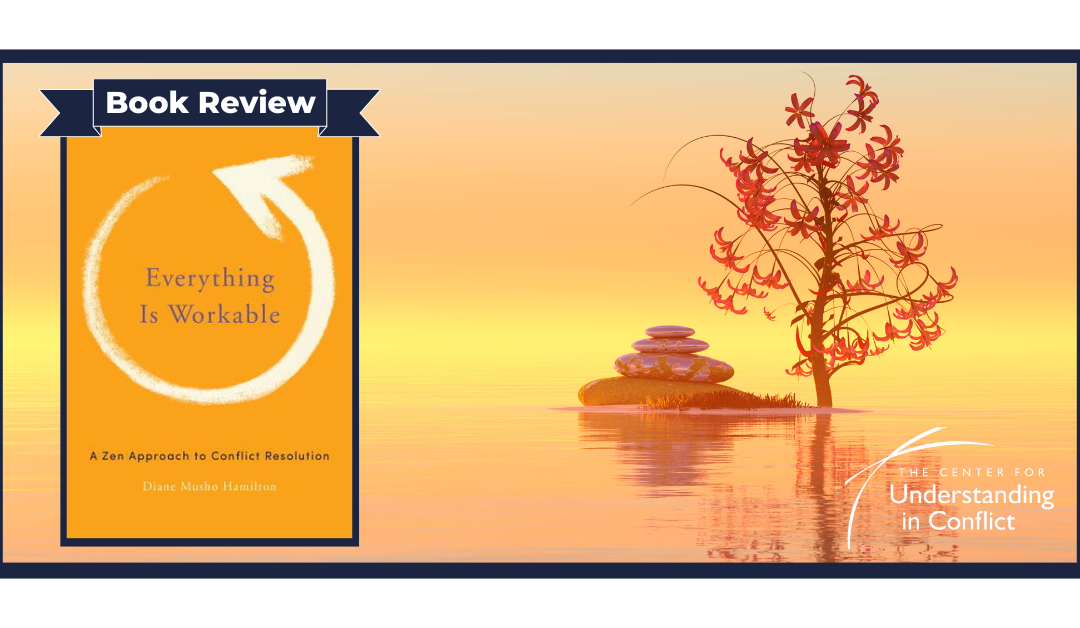Diane Musho Hamilton’s book Everything Is Workable: A Zen Approach to Conflict Resolution offers a unique and insightful perspective on addressing conflict through the principles of Zen Buddhism. Understanding-based conflict resolution practitioners can find Hamilton’s approach deeply resonant with core values and practices emphasizing empathy, mindfulness, and conflict’s transformative potential.
Hamilton, an experienced mediator and Zen practitioner, weaves her rich background in both fields to present a compelling case for viewing conflict as an opportunity for growth and understanding. She argues that embracing a mindful, non-judgmental stance not only enables us to navigate disputes more effectively but also unlocks their transformative potential, creating deeper connections with those involved and fostering hope for resolution.
One of the book’s standout features is its emphasis on mindfulness. Hamilton illustrates how mindfulness can be a powerful tool in mediation, helping practitioners stay present and attuned to the dynamics at play. For understanding-based practitioners, this approach aligns perfectly with our emphasis on staying connected to the parties’ experiences and emotions. Hamilton’s guidance on cultivating mindfulness is practical and accessible, offering exercises and reflections that can be easily integrated into our mediation practice.
Hamilton also delves into the concept of “Big Mind,” a Zen perspective that encourages seeing beyond the immediate conflict to the broader context and interconnectedness of all parties. This viewpoint is invaluable for conflict resolution practitioners, as it encourages us to look at the underlying needs and interests driving the conflict rather than getting bogged down in positions. By adopting a Big Mind approach, mediators can facilitate more holistic and creative solutions that honor the more profound aspirations of all involved.
Another highlight is the book’s practical advice on dealing with difficult emotions. Hamilton acknowledges that conflict resolution practitioners often encounter intense emotions such as anger, fear, and frustration. Her Zen approach offers techniques for working with these emotions constructively, allowing mediators to remain calm and centered even in challenging interactions. Maintaining emotional equilibrium is crucial for understanding-based mediators, who strive to create a safe and respectful environment for all parties.
Hamilton’s use of personal anecdotes and real-life mediation stories adds depth and relatability to her teachings. These stories illustrate the practical application of Zen principles in mediation, demonstrating how they can transform even the most entrenched conflicts. For understanding-based mediators, these examples provide valuable insights into incorporating mindfulness, empathy, and compassion into our practice.
While “Everything Is Workable” is rooted in Zen philosophy, Hamilton’s approach is adaptable and relevant to professionals from various backgrounds. She skillfully bridges the gap between Eastern and Western traditions, making her insights accessible to a broad audience. This inclusivity is not just a feature, but a core value of Hamilton’s approach, particularly important for understanding-based mediators, who often work with diverse populations and seek to create inclusive and equitable processes, making us all feel respected and valued in our practice.
Diane Musho Hamilton’s integration of Zen principles with mediation practice offers a profound and practical framework for addressing conflict. By embracing mindfulness, empathy, and conflict’s transformative potential, Hamilton provides mediators with valuable tools to enhance their practice and facilitate more profound, meaningful resolutions. This book enriches our understanding of conflict resolution and inspires us to approach our work with greater compassion and mindfulness.
